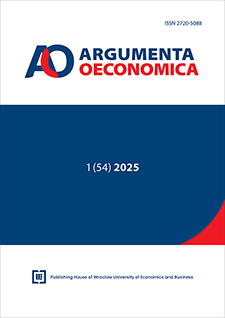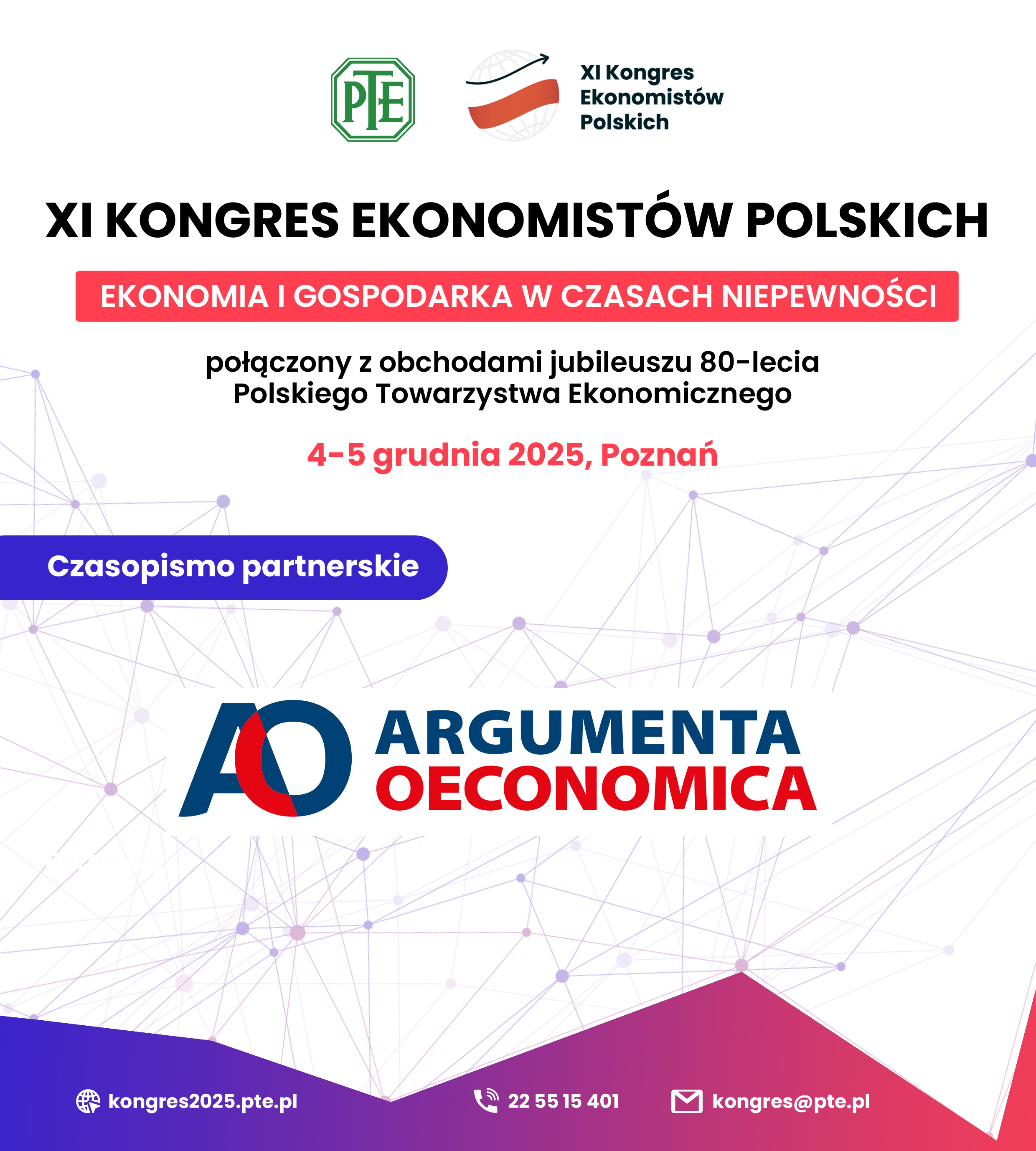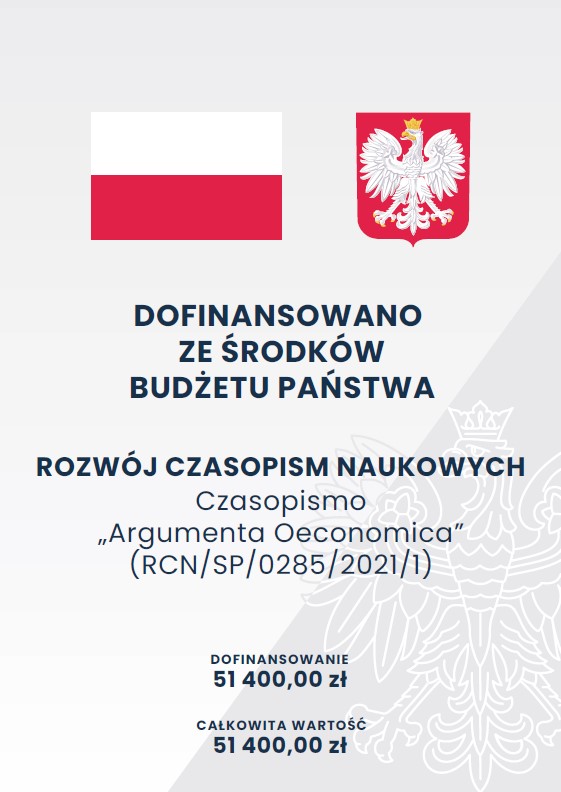Effects of minimum wage changes on the wage distribution in low-wage and high-wage sectors
DOI:
https://doi.org/10.15611/aoe.2025.1.11Keywords:
minimum wage, low-wage sector, wage distribution, spill-over effectsAbstract
Aim: The research aims to compare the effects of a change in the national minimum wage on the wage distribution in the low and high-paid economic sectors. We assess how wages in different economic sectors react to the minimum wage policy established at the national level.
Methodology: We use individual wages and employment characteristics data from the Structure of Earnings Survey in Poland. The methodology applied in this study uses reweighting decomposition based on the non-parametric approach of DiNardo et al. (1996).
Results: The results showed that minimum wage growth impacts economic sectors differently. In low-wage sections, minimum wage legislation forced wage growth in the left tail of the wage distribution. Up to the third decile, wage growth was equal to minimum wage growth. Moreover, the results indicated the significantly varying lengths of the spill-over effects across the analysed NACE sections. We found strong spill-over effects in low-wage sections on the entire wage distribution. In the high-wage sector, we did not observe the spill-over effects of a minimum wage increase.
Implications and recommendations: Our results are important from both the theoretical and practical points of view as they explain why the literature reports conflicting evidence regarding the impact of minimum wage changes on wage distribution and the presence of the spill-over effects. Our results indicate that the most important reason is that national minimum wage increases affect wages in different parts of the economy to different extents, and thus are beneficial for the policymakers. They show that from the point of view of the policy of compressing wage inequalities, the effects of raising the minimum wage turned out to be not so obvious.
Originality/value: According to our knowledge, this is the first study on the impact of minimum wage on wage distribution at the NACE economic section level.
Downloads
References
Autor, D. H., Manning, A., & Smith, C. L. (2016). The contribution of the minimum wage to US wage inequality over three decades: A reassessment. American Economic Journal: Applied Economics, 8(1), 58-99. https://doi.org/10.1257/app.20140073
Bauducco, S., & Janiak, A. (2018). The macroeconomic consequences of raising the minimum wage: Capital accumulation, employment and the wage distribution. European Economic Review, 101, 57-76. https://doi.org/10.1016/j.euroecorev.2017.09.012
Butcher, T., Dickens, R., & Manning, A. (2012). Minimum wages and wage inequality: Some theory and an application to the UK. Centre for Economic Performance Discussion Paper No. 1177, LSE.
Campolieti, M. (2020). Does an increase in the minimum wage decrease employment? A meta-analysis of Canadian studies. Canadian Public Policy, 46(4), 531-564.
Card, D., & Krueger, A. B. (1994) Minimum Wages and Employment: A Case Study of the Fast-Food Industry in New Jersey and Pennsylvania. The American Economic Review, 84, 772-793.
Dickens, R., & Manning, A. (2004a). Has the national minimum wage reduced UK wage inequality? Journal of the Royal Statistical Society: Series A, 167(4), 613-626.
Dickens, R., & Manning, A. (2004b). Spikes and spill-overs: The impact of the national minimum wage on the wage distribution in a low-wage sector. The Economic Journal, 114(494), C95-C101.
DiNardo J., Fortin N., & Lemieux T. (1996). Labor Market Institutions and the Distribution of Wages, 1973-1992: A Semi-parametric Approach. Econometrica, 64(5), 1001–44. https://doi.org/10.2307/2171954
Dolton, P., Bondibene, C., & Wadsworth, J. (2012). Employment, inequality and the UK national minimum wage over the medium-term. Oxford Bulletin of Economics and Statistics, 74(1), 78-106. https://doi.org/10.1111/j.1468-0084.2011.00653.x
Dube, A. (2019). Impacts of minimum wages: Review of the international evidence. Retrieved from: https://assets.publishing.service.gov.uk/government/uploads/system/uploads/attachment_data/file/844350/impacts_of_minimum_wages_review_of_the_international_evidence_Arindrajit_Dube_web.pdf
Firpo, S., Fortin, N. M., & Lemieux, T. (2009). Unconditional quantile regressions. Econometrica, 77, 953-973. https://doi.org/10.3982/ECTA6822
Garcia-Louzao, J., & Tarasonis, L. (2023). Wage and Employment Impact of Minimum Wage: Evidence from Lithuania. Journal of Comparative Economics, 51(2), 592-609. https://doi.org/10.1016/j.jce.2022.12.002
Gopalan, R., Hamilton, B. H., Kalda, A., & Sovich, D. (2021). State Minimum Wages, Employment, and Wage Spillovers: Evidence from Administrative Payroll Data. Journal of Labor Economics, 39(3). https://doi.org/10.1086/711355
Gregory, T., & Zierahn, U. (2022). When the minimum wage really bites hard: The negative spillover effect on high-skilled workers. Journal of Public Economics, 206, 104582. https://doi.org/10.1016/j.jpubeco.2021.104582
ILO (2020). Global Wage Report 2020–21: Wages and minimum wages in the time of COVID-19, International Labour Office.
Laporšek, S., Vodopivec, M., & Vodopivec, M. (2019). Spillover effects of a minimum wage increase – evidence from Slovenia. Post-Communist Economies, 31(5), 603-622. https://doi.org/10.1080/14631377.2019.1578582
Lin, C., & Yun, M. S. (2020). The Effects of the Minimum Wage on Earnings Inequality: Evidence from China (pp. 165-195). In S. Li & C. Lin (Eds.) Minimum Wages in China. Evolution, Legislation, and Effects. Palgrave Macmillan. https://doi.org/10.1007/978-981-15-2421-9_7
Majchrowska, A. (2022). Does the minimum wage affect inflation? Ekonomista, 4, 417-436. https://doi.org/10.52335/ekon/156331
Majchrowska, A., & Strawiński, P. (2018). Impact of minimum wage increase on gender wage gap: Case of Poland. Economic Modelling, 70, 174-185. https://doi.org/10.1016/j.econmod.2017.10.021
McCausland, W. D., Summerfield, F., & Theodossiou, I. (2020). The Effect of Industry-Level Aggregate Demand on Earnings: Evidence from the US. Journal of Labor Research, 41, 102-127. https://doi.org/10.1007/s12122-020-09299-z
Mincer J. (1974). Schooling, Experience and Earnings. National Bureau of Economic Research.
Neumark, D., Schweitzer, M., & Wascher, W. (2004). Minimum wage effects throughout the wage distribution. Journal of Human Resources, 39(2), 425-450. https://doi.org/10.2307/3559021
Neumark, D., & Shirley, P. (2021). Myth or measurement: What does the new minimum wage research say about minimum wages and job loss in the United States? National Bureau of Economic Research.
Neumark, D., & Wascher, W. (2000) Minimum Wages and Employment: A Case Study of the Fast-Food Industry in New Jersey and Pennsylvania: Comment. The American Economic Review, 90, 1362-1396.
Nikulin, D., Wolszczak-Derlacz, J., & Parteka, A. (2022). Working conditions in global value chains: Evidence for European Employees. Work, Employment and Society, 36(4), 701-721. https://doi.org/10.1177/0950017020986107
Pereira, J. M. R., & Galego, A. (2019). Diverging trends of wage inequality in Europe. Oxford Economic Papers, 71(4), 799-823. https://doi.org/10.1093/oep/gpy072
Redmond, P., Doorley, K., & McGuinness, S. (2021). The impact of a minimum wage change on the distribution of wages and household income. Oxford Economic Papers,73(3), 1034-1056. https://doi.org/10.1093/oep/gpaa048
Sefil-Tansever, S., & Yılmaz, E. (2023). Minimum wage and spillover effects in a minimum wage society. Labour, 38(1), 150-176. https://doi.org/10.1111/labr.12259
Sotomayor, O. J. (2021). Can the minimum wage reduce poverty and inequality in the developing world? Evidence from Brazil. World Development, 138, 105182. https://doi.org/10.1016/j.worlddev.2020.105182
Stewart, M. B. (2012). Wage inequality, minimum wage effects, and spillovers. Oxford Economic Papers, 64(4), 616-634. https://doi.org/10.1093/oep/gps003
Strawiński, P., & Broniatowska, P. (2021). Foreign- and domestic firm ownership and its impact on wages. Evidence from Poland. European Journal of Industrial Relations, 27(4), 445-466. https://doi.org/10.1177/0959680121996675
Teulings, C. (2003). The contribution of minimum wages to increasing wage inequality. The Economic Journal, 113, 801-33.
Wolfson, P., & Belman, D. (2019). 15 years of research on US employment and the minimum wage, Labour. 33(4), 488-506. https://doi.org/10.1111/labr.12162
Downloads
Published
License
Copyright (c) 2025 Paweł Strawiński, Aleksandra Majchrowska

This work is licensed under a Creative Commons Attribution-ShareAlike 4.0 International License.
Accepted 2024-06-01
Published 2025-04-25








